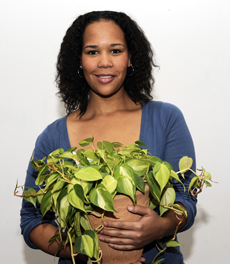
If you get out, are you obligated to give back? Living Green, a world premiere drama by Victory Gardens Playwrights Ensemble member Gloria Bond Clunie (North Star, Shoes), explores this and other thorny questions in its story of a well-to-do African American family "living green" in a mostly white Chicago suburb, who are contemplating a move back to the old neighborhood.
Set in 1995, the year of the Million Man March, Living Green looks back at a recent moment in black history while investigating issues seemingly ripped from today's headlines. What happened to our families as we "moved up" and fled the black neighborhoods that once nurtured us? How do we revitalize our communities? How do we protect our children from the violence that plagues our streets?
Meet Angela and Frank Freeman, hardworking parents who moved out of the old neighborhood years ago to give their children, Dempsey and Carol, what they never had - access to great schools and well-manicured lawns. Trouble is, Frank is worried he and Angela may have traded away their children's identity as African Americans in the process. With Carol about to graduate from high school, Frank suggests they move back to the city, and join a few families who are trying to make a difference. Angela, however, is too worried about safety. "Thanks," she says, "but I like life." Newly energized with the sense of community generated by the Million Man March, the Freemans make plans to sell their home, just as they take in 16-year-old Shondra, a bright girl raised in the projects. Can their newfound idealism survive the very real challenges Shondra brings into their home?
Regarding the play's title, Living Green, "people have asked if this is a play about ecology," says Clunie. "In some ways, yes. If you've got money, you're life is greener. You're able to afford green. Literally, and ecologically. But should green only be possessed by the people who can afford it?"
Clunie adds, "the title is really inspired by the plant in Lorraine Hansberry's A Raisin in the Sun. The small potted plant represents Mama Younger's dream of owning a house with a garden - a dream that propels much of the action in a play about an African American family consigned to a specific community, and they want to expand beyond that. And I began to wonder what happened to us as we moved out of our communities? Now some wonderful things happened. Opportunities expanded. But there were new demands, a few losses, and other important questions of the heart."
Special events in anticipation of February, Black History Month, include:
Low-priced previews of Clunie's modern-day homage to A Raisin in the Sun begin January 23, 2009 at the Victory Gardens Biograph Theater, 2433 N. Lincoln Avenue, Chicago. Regular performances of Living Green run through March 1. Single tickets are $20-$48. Four-play subscriptions including Living Green start at only $64. For ticket and subscription information, call the Victory Gardens box office - 773.871.3000 or visit www.victorygardens.org.

 Follow Us On Twitter
Follow Us On Twitter